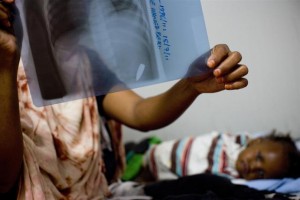聯合國兒童基金會高度關注索馬里兒童安危 10月武裝衝突升級 釀成24死58重傷
2011-11-15
奈洛比,肯尼亞/香港,2011年11月15日——索馬里武裝衝突不斷升級,聯合國兒童基金會(UNICEF)對此表示高度關注,尤其是武裝衝突對兒童安危的影響。
「在索馬里南部和中部地區,愈來愈多兒童和市民在暴力襲擊和駁火中被擄走。」UNICEF駐索馬里辦事處代表Sikander Khan先生直言:「兒童的傷亡數字在過去數周不斷飆升,情況令人非常憂慮。」

根據聯合國武裝衝突嚴重侵犯兒童監察及報告機制資料,10月份因當地武裝衝突事件不幸喪生的兒童,較今年月均數字倍增至24名;同月更有58名兒童確認為重傷,是索馬里本年錄得單月兒童重傷數字最高的一次。監察及報告機制已證實由年初至今一共有近300名兒童在索馬里的持續武裝衝突中受重傷,另造成超過100名兒童死亡。
Khan先生坦言:「相對我們確認到的死傷數目,事實上可能有更多兒童被殺或受傷害,只是未有通報或獲得證實。」
此外,兒童被武裝部隊徵召入伍和婦孺遭受性暴力對待的問題亦備受關注。監察及報告機制已證實逾600名兒童被招攬作童兵;逾200名兒童被強姦,當中大部分為女童。
Khan先生續指:「武裝部隊步步進逼,暴力衝突持續加劇,令索馬里兒童的生命面臨更大威脅。本會依照國際法律,積極呼籲各界制止索馬里的武裝衝突,以免更多兒童遭到殺害及殘害、被招募及利用當兵,或遭受強姦。我們必須立即採取行動,確保兒童在暴力事件中,能安全並受到保護。」
 |
![On 27 July, Asad [NAME CHANGED] (left) holds a gun in a reception centre for former soldiers from the rebel Al-Shabaab group, in Mogadishu, the capital. About 15 days ago, I was on my way back from school when some men with long beards approached me and told me that they wanted to give me some money, he said. They handed me 40 US dollars... They said if I went with them that I could keep the money they had given me. So I went with them to a camp that was near to Mogadishu. There were many men in this camp and lots of other children around my age. I was given a place to sleep and we were given lessons in things like guns and weapons... They were nice to us, these people. They never shouted at us and only wanted us to be good at shooting... A few days ago we were told that we were leaving the camp for the front line in Mogadishu. We walked to a group of houses where we waited. Then very early yesterday morning there was a big attack... There was a lot of shooting and firing and shouting& I fired all of my bullets and then realized that all of our colleagues in buildings around us had gone& So we decided to surrender. We walked out of where we were with our arms and guns above our heads. The AU [African Union] soldiers treated us very well and didn't fire at us. I was scared they might. The soldiers told us to put the weapons down and then gave us some food and water. They were kind to us& I hope that I can go home. Al-Shabaab forces control much of southern and central Somalia. AMISOM was established by the United Nations to support peace, stability and the safe delivery of humanitarian aid in the country. UNICEF works on all sides of the long-running conflict. By 29 July 2011, the crisis in the Horn of Africa affecting primarily Kenya, Somalia, Ethiopia and Djibouti continues, with a worsening drought, rising food prices and an ongoing conflict in Somalia. More than 12 million people are threatened by the regions worst drought in 60 years. Some 500,000 severely malnourished children in drought-affected areas are at imminent risk of dying, while a further 1.6 million moderately malnourished children and the wider-affected population are at high risk of disease. Somalia faces one of the worlds most severe food security crises; and as many as 100,000 displaced people have sought security and assistance in Mogadishu, the still-embattled capital, in the last two months, and tens of thousands are fleeing into Kenya and Ethiopia. Famine has been declared in the Lower Shabelle and Bakool areas, and it is believed all of Southern Somalia could fall into a state of famine without immediate intervention. Across Southern Somalia, 1.25 million children are in urgent need of life-saving assistance, and 640,000 are acutely malnourished. UNICEF has delivered supplementary feeding supplies for 65,000 children and therapeutic food for 16,000 severely malnourished children in Southern Somalia, and is working with UN, NGO and community partners to expand blanket supplementary feeding programmes where needed. UNICEF is also supporting a range of other interventions, including an immunization campaign targeting 40,000 children in Mogadishu. A joint United Nations appeal for humanitarian assistance for the region requires US$2.5 billion, less than half of which has been committed.](/wp-content/uploads/2015/12/15-11-11_somalia_conflict_recruitment-for-armed_services-300x189.jpg) |
武裝衝突升級,亦阻礙了人道救援物資的運送。「在饑荒和疾病的雙重打擊下,成千上萬的兒童命懸一綫。在這生死存亡的關頭,兒童竟面臨救援物資中斷。」Khan先生呼籲:「現時當地婦女及兒童正處於水深火熱之中,我們不能視而不見,眼白白讓數以千計的兒童逐一死去。所以我懇請各界施予援手,支持我們迅速進行全面的拯救行動。」
關於聯合國監察及報告機制
聯合國自2005年底,已密切監察索馬里任何嚴重違反兒童權利的情況。行動是根據聯合國安全理事會在2005年通過的第1612號決議、在2009年通過的第1882號決議和在2011年通過的第1998號決議下進行。機制多年來收集了兒童在武裝衝突中嚴重侵犯兒童的情況,包括:殺害或殘害兒童、招募或利用兒童當兵、強姦或其他嚴重性虐待兒童的行為、拐騙兒童、襲擊學校或醫院及不准外界向兒童提供人道主義援助。









